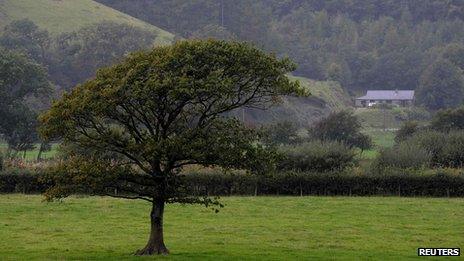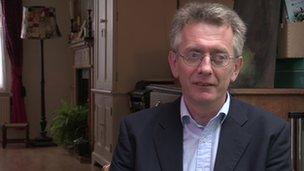Rural broadband: Former BT boss attacks 'outrageous' costs
- Published

Mike Kiely says estimates for the cost of connecting rural Britain have fluctuated wildly
Mike Kiely was a senior manager for BT when he left the company after what he describes as "22 happy years".
He became an independent telecoms consultant at the Department of Culture Media and Sport where he advised ministers and civil servants on the rural broadband project.
At a cost of £2.5bn, the scheme aims to connect most of rural Britain - around 25,000 communities - to superfast broadband internet by 2015.
Around half of the money, some £1.2bn, has been put up by central and local government with the rest expected from BT.
Street telecoms cabinets are being installed in villages and hamlets and then connected by superfast fibre cables to telephone exchanges and handover points.
At the outset, nine of BT's competitors, including the giant Fujitsu competed for the work, but one by one they have fallen away.
So far, BT has been awarded 26 of the 44 contracts let by local authorities and, according to the Public Accounts Committee, looks set to win the remaining 18.
'No justification'
Mr Kiely, 50, became increasingly concerned about the way the government handled the project.
In his view, there was too little transparency about the costs being attributed to BT with wildly fluctuating estimates about the work.
In Northern Ireland, where the programme was first rolled out, the average cost of a cabinet installation was £37,787, which included £14,229 in public funds.

Mike Kiely was with BT for 22 years before working as a consultant for the government
But Mike Kiely says the average cost charged by BT for work on the mainland could be between £61,814 and £80,278, allowing the telecoms giant to draw down a public subsidy in each case of about £47,596 or 77% of the total.
In his only interview, Mr Kiely told BBC Radio 4: "I've tried to reconcile these costs, but I can find no justification.
"As far as we know, we don't yet know precisely what BT has billed councils in Britain but we do know that it has the potential to bill this much.
"It is outrageous and sometimes you don't feel apologetic for saying it because that's the number and sometimes you can't say it but that's the only number we have in the public domain until further reconciliation work can be done."
BT has denied inflating costs to soak up as much public subsidy as possible, and has rejected allegations by the Public Accounts Committee that it has exploited its "quasi-monopolistic position".
Sean Williams, BT's strategy director, said: "It's completely untrue, we're not exploiting any position at all.
"We're investing over £3bn to roll out fibre networks across rural Britain.
"When they're built, it will be available to all of our competitors. We're being completely open about our costs.
"And when it's done, the UK will have the best superfast network in Europe in 2015."
'Explanation needed'
Mr Kiely has also questioned BT's promise to provide half of the money needed to fund the scheme.
He said the National Audit Office (NAO) established that BT's contribution will be closer to 23% of the total, around £356m. Again this claim is strongly contested by BT.
He added: "It appears BT was telling the NAO in July that it was expecting to invest £500m in capital investment, none of which anyone can examine thoroughly, then another £500m in what are described as 'operational costs'.
"The original billion pounds offer to the House of Lords by BT sounded very unambiguous at the time and that needs to be examined. There's definitely been a reduction in capital commitment and that needs explaining."
Mr Kiely also agrees with the Public Accounts Committee's findings that there is a lack of transparency over BT's costs.
In January, the company charged Rutland County Council an average of £16,400 per cabinet for 13 separate parishes and yet a senior BT executive recently quoted a figure of £100,000 per cabinet.
"That sort of figure is just tautological nonsense," said Mr Kiely.
"There's nothing stopping anyone buying a cabinet on line and paying BT £8,000 to connect it up to its network. Most engineers would find that sort of figure pretty offensive."
Mr Kiely's contract with BDUK, the rural broadband delivery unit within the Department of Culture Media and Sport, was terminated last year after his letter to a local authority warning of possible overcharging was published without his consent by a blogger.
"I think BT will do a fantastic job," he said of his former employer. "But there are a number of very important issues in relation to rural broadband that need investigating."
- Published26 September 2013
- Published1 September 2013
- Published25 July 2013
- Published5 July 2013
- Published5 July 2013